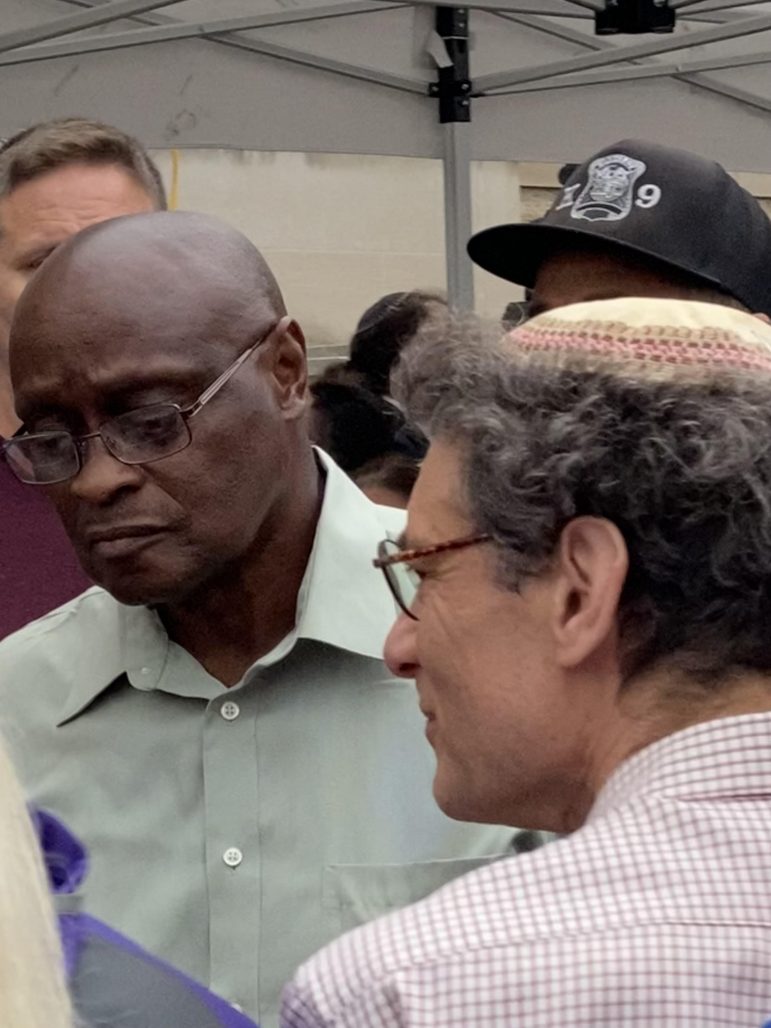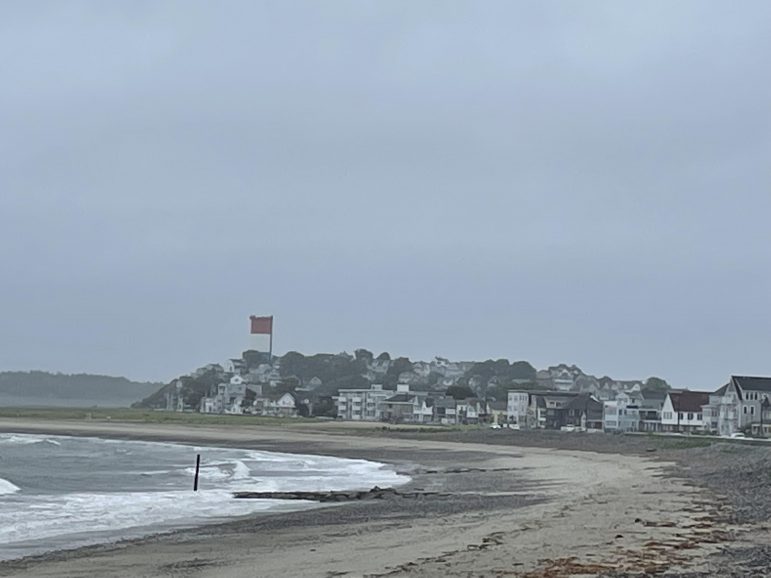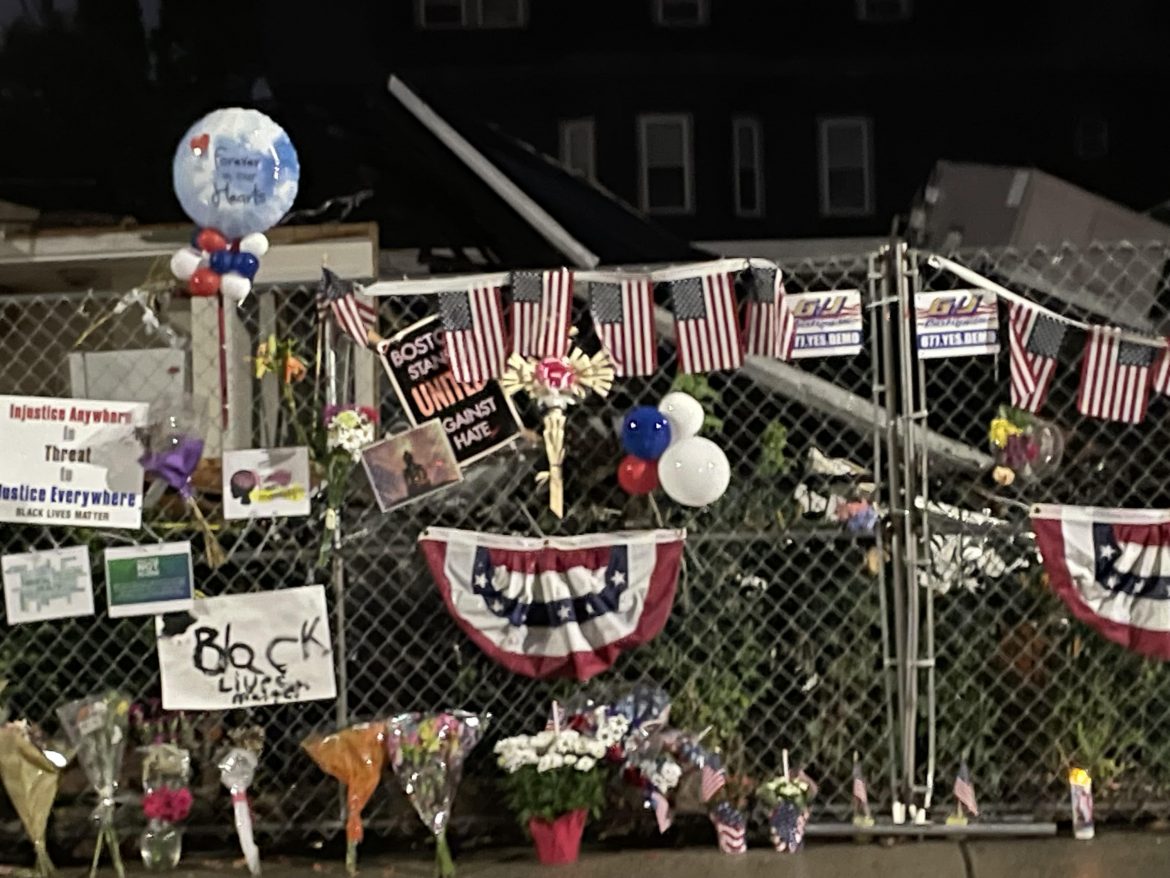
The shootings seem far away, until they’re not. White supremacist violence has assaulted my hometown of Winthrop, Massachusetts, adding yet another place and its people to the national litany of sorrow and shame. I feel it deeply. I haven’t lived in Winthrop since I was eighteen, and my last Winthrop relatives died a few years ago, but a deep bond of memory and affection still joins me to the town by the sea where I grew up. The sea speaks to all who live in Winthrop, to each one in their own way of hearing, a shared metaphor in all of its ways and moods. Yet another explosion of hate, of racist violence that has taken the lives of two African Americans, this time in a place very familiar to me, the place of my earliest memories of both love and hate among neighbors. First, to say their names, David Green and Ramona Cooper. David and Ramona were killed on Shirley Street, a magical place in my childhood memories. My grandparents had a
Photo: David Rabinovitz
small store on Shirley Street for a time, the Beach Specialty Shop. A bit further down was Baron’s grocery store, then Appel’s kosher butcher store, and then Kaplow’s, owned by two sets of siblings, Izzy and Fannie, Sadie and Sam, the most wonderful store I have ever known, sawdust on the floor, a large pickle barrel, and a Franklin stove. It was all part of what seemed to me later to have been the Winthrop shtetl. There were also the two shuls, the “little shul,” which was Tifreth Abraham, and the “big shul,” which was Tifereth Israel.
The shootings and the ramming and destruction of a small house with a stolen truck – once the site of a corner store where we would stop for sweets on our way home from school – all happened on a quiet Saturday afternoon, on Shabbos, the Jewish Sabbath, the mayhem playing out a short distance from the two shuls. In the Boston synagogue that my wife and I founded, Nehar Shalom Community Synagogue, the reading table comes from one of those shuls, the “little shul.” Our first Torah scroll comes from the other shul, the “big shul.” Our shul is joined with a timeless bond to Winthrop. From antisemitic literature found with the shooter, there is speculation that he may have been headed next to the shuls. First, he killed the two Black people he saw, David Green and Ramona Cooper, systematically sparing those of white skin encountered on the way.
I was stunned and shaken as I read the newspaper the following Monday morning, more details filling out the story. I thought at first that there must be many Black people in Winthrop now, not like then when there were just a handful of Black families. I was trying to push away any possibility of personal connection to the dead, of knowing the victims. Images of a place and its people, memories held in the amber of time, shimmering as I looked at the photograph of David, something familiar in his warm, quizzical look. I began to read, soon trembling and then crying. When I read that David was a lifelong resident of Winthrop, I knew. I knew David’s family growing up. His older brother Ray and I were co-captains of the High School gymnastics team, that familial warm, quizzical look smiling from the pages of my high school yearbook. His father, whom my siblings and I knew only as Mr. Green, worked as a house cleaner and cleaned our house, as well as my grandmother’s and my aunt’s house. I remember having lunch with him at our kitchen table on days when I must have been off from school, always Mr. Green, the message not lost. Only now, in reading about this grieving family, have I learned that he was Ray Sr. The Greens lived on Shirley Street in a small red house between the two shuls, just down from the beach.
Click Here to make a tax-deductible contribution.
There was a tide of racism that pulsed just beneath the surface of our town in those days. There were times when it came without inhibition, unrestrained and harsh, like the waves that crashed over the Front Beach wall during a nor’easter. At other times it came more subtly, shrouded in a veneer of civility, bringing a sudden chill, like the fog that blew in from the sea. There were parts of town that were known to be restricted, where Jews and Blacks couldn’t live. In the year following my Bar Mitzvah, I would walk after school from Winthrop Junior High School to the post office, which was the town’s only federal building. Through that year, I stood in a vigil with an Episcopal minister, Rev. Bob Barnes, to urge passage of the 1964 Voter Registration Bill, which led to the Civil Rights Act of 1964 and the Voting Rights Act of 1965, legislation that has been cruelly and cynically eviscerated today. During that year, as the seasons turned, I heard words that I had never heard before, the hate unmistakable, though, as it was spewed from cars and passersby against Blacks and Jews. Most painful, was then to be back in school and hear the racist jokes and banter of classmates, an invidious reflection of what was heard at home. As the civil rights and anti-war movements found common ground, becoming for many parts of one struggle, so too did opposition coalesce, hate and violence simmering just beneath the surface. I sat in the car and waited as my friend and mentor, Rev. Bob Mackie of Saint John’s Episcopal Church, Rev. Barnes’ successor, went into the Elks Club building, seeking a town selectman who had been avoiding him in his application for a permit to hold a peace vigil. Rev. Mackie was visibly shaken when he returned to the car, having been threatened by the selectman, warned of “maybe a shot” through his window. The Elks building is across from the far ends of both Veterans Road and Shirley Street, where the violence has now played out.

Some fifty years later, shots rang out in Winthrop. The murders of David and Ramona are part of a pandemic of hate that is not unique to Winthrop. Of guns, guns so easily acquired yet again, the bullets that killed these two beautiful human beings were not of a hate spawned specifically in Winthrop, but spawned by the pandemic of white supremacist violence that is sweeping this land, that is carried deep in the American bloodstream. It is the same virus mutated from way back then, just as lethal, but more visible to more people than the lynching, the shootings, the Jim Crow laws. Harder to avert our eyes, today’s violence is more visible to more people in more places, touching all of us more directly wherever we live. Still, the fog of avoidance and confusion rolls in unannounced, easy to lose our way, even as we nurture new clarity and hope.
The lighthouses that for centuries have guided ships home from just off Winthrop’s shore, their light upon the water, become the metaphor for us. My childhood bedroom was touched each night by their steady, rhythmic flashes of light. Winthrop has changed. It is clear in the words and tears of the people who are Winthrop today, heartbroken in solidarity and collective grief. It is clear in the words of town leaders, in there being such town leaders, who say that there is no place for hate in Winthrop. It is clear in the simple, homemade Black Lives Matter signs placed at makeshift memorials for Ramona and David. But the hate is still among us, felt by all of us because we are part of the greater whole that is America. As Winthrop has changed, drawing on the spirit of good people who have always been there, neighbors all, so too, we can all be part of a greater healing. We shall all be safe only when a vaccine of love and respect, of justice and peace, of gentleness, is cultured and injected through word and deed into the lifeblood of this country.
Going home to Winthrop to participate in a memorial vigil, the route into town is as familiar as yesterday’s walk to school, bringing a flood of memories and emotions. The winds of change in Winthrop are as clear and refreshing as the cleansing breeze that follows a storm. There is so much good, and yet avoidance and nervousness, it seems, to address directly the racism and hate that killed David and Ramona. Among all who spoke at the vigil, but for a brief reference to racism in a letter read on behalf of Ramona’s son in memory of his mom, there was no further mention of racism, or of white supremacy, or of gun laws, or of how what happened in Winthrop is part of a greater web of hate and violence. I am troubled. I struggle to understand, and yet to be understanding, to be compassionate, and wary of smugness. I keep waiting, but there is no such mention from faith and civic leaders. Perhaps, responding to the palpable collective grief, they feel called to fill only a pastoral role tonight, only to speak to the heart. Perhaps coming too near to the harsher truths and to the politics of redress and healing threatens a fragile construction of America still nurtured in the old hometown.
I sense a way of uncritical patriotism that is as simple and sincere as it is worrisome in its similarity to the way it was back then. At the same time, I am touched by a certain way of goodness, almost of innocence, in people’s unaffected sense of each other as friends and neighbors. In a moment of sorrowful reunion, Ray conveyed more hope than anger, telling of the good he saw in the wake of his immense personal loss, so moved by the outpouring of love and the coming together of people, hoping that would endure as his brother’s legacy. And yet, sitting on a bench near me during the vigil, an elder Black woman wept inconsolably, crying out in pain, her words and tears profoundly real in their expression of grief and its context. I took a few steps toward her, knelt down, and took her hand in mine, trying to offer words of comfort. She whispered, “I’ve lived here for thirty years and no one knows what it was like for me, and now this.”
The shootings seem far away, until they’re not. “And now this.” As much as I try to identify with all of the places and people assaulted by racist violence, this one has touched me more personally. Gathering on the green in front of Winthrop Town Hall, there is no need to search for a permit. From where we stand in vigil, the old junior high school I attended is diagonally across the street to one side. Diagonally across the street to the other side, at the end of the short walk between, is the building that once was the post office, today the police station, where a thirteen-year-old Jewish boy recently become man stood alone with a Protestant minister and called for justice. In standing together now, may there be hope, the coming of change as real as the tides, for all their ebb and flow, David and Ramona’s souls shining as a blessing, their light upon the water.
Click Here to make a tax-deductible contribution.
Share on Social Media:
Yet another explosion of hate, of racist violence that has taken the lives of two African Americans, this time in a place very familiar to me…, my hometown of Winthrop, Massachusetts. https://t.co/mVtcF8pJf2
— Tikkun Magazine (@tikkunonline) July 7, 2021

How to hold together the grief, rage, and hope? This essay does it beautifully.
A beautiful treatise on our beloved hometown, and the too-often confused and violent world around it. Your name was familiar to me because I think you were a classmate of my brother, John Reid. I remember you and Ray Green on the Gymnastics team. Before our family finally settled down in the family home on Woodside Park, we spent a few years in Detroit (Indian Village), on the outskirts of black neighborhoods. In fact, the 1967 riot perimeter was Maxwell Street, just behind our street, Seminole. We went to a city school with many black classmates. My mother loved to tell the story of my black classmate’s party. I had asked to attend the party, a block or so from our home, never mentioning that it was a black family. I asked my parents to pick me up after the party, on the other side of busy Charlevoix Ave. They were surprised and impressed when a black parent opened the front door, and that I had never mentioned that my friend was black. I feel fortunate to have had those formative experiences when young. All good luck and best wishes to you and your wife, your new venture, and your spiritual leadership.
Hello Victor,
Thank you for your beautiful and honest article. It reflects so much of what I remember growing up in Winthrop. My hope for my grandchildren is that they grow up in a kinder and more inlcusive world than we did. Thank you for your work.